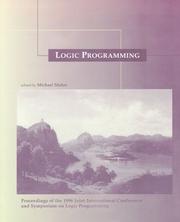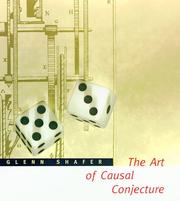| Listing 1 - 3 of 3 |
Sort by
|

ISSN: 10610464 ISBN: 0262631733 9780262291309 9780262631730 0262291304 Year: 1996 Publisher: Cambridge, Mass. ; London : MIT,
Abstract | Keywords | Export | Availability | Bookmark
 Loading...
Loading...Choose an application
- Reference Manager
- EndNote
- RefWorks (Direct export to RefWorks)
September 2-6, 1996, Bonn, Germany Every four years, the two major international scientific conferences on logic programming merge in one joint event. JICSLP'96 is the thirteenth in the two series of annual conferences sponsored by The Association for Logic Programming. It includes tutorials, invited lectures, and refereed papers on all aspects of logic programming including: Constraints, Concurrency and Parallelism, Deductive Databases, Implementations, Meta and Higher-order Programming, Theory, and Semantic Analysis. The contributors are international, with strong contingents from the United States, United Kingdom, France, and Japan. Logic Programming series, Research Reports and Notes.
681.3*F1 --- 681.3*I23 Deduction and theorem proving: answer/reason extraction; reasoning; resolution; metatheory; mathematical induction; logic programming (Artificial intelligence) --- Deduction and theorem proving: answer/reason extraction; reasoning; resolution; metatheory; mathematical induction; logic programming (Artificial intelligence) --- 681.3*I24 <063> Knowledge representation formalisms and methods: frames and scripts; predicate logic; relation systems; representation languages; procedural and rule-based representations; semantic networks (Artificial intelligence)--Congressen --- Knowledge representation formalisms and methods: frames and scripts; predicate logic; relation systems; representation languages; procedural and rule-based representations; semantic networks (Artificial intelligence)--Congressen --- 681.3*F1 Computation by abstract devices --- Computation by abstract devices --- Logic programming --- Logic programming - Congresses --- COMPUTER SCIENCE/Programming Languages

ISBN: 026219368X 9780262290999 9780262193689 0262290995 Year: 1996 Publisher: Cambridge, Mass. : MIT Press,
Abstract | Keywords | Export | Availability | Bookmark
 Loading...
Loading...Choose an application
- Reference Manager
- EndNote
- RefWorks (Direct export to RefWorks)
"In The Art of Causal Conjecture, Glenn Shafer lays out a new mathematical and philosophical foundation for probability and uses it to explain concepts of causality used in statistics, artificial intelligence, and philosophy.The various disciplines that use causal reasoning differ in the relative weight they put on security and precision of knowledge as opposed to timeliness of action. The natural and social sciences seek high levels of certainty in the identification of causes and high levels of precision in the measurement of their effects. The practical sciences--medicine, business, engineering, and artificial intelligence--must act on causal conjectures based on more limited knowledge. Shafer's understanding of causality contributes to both of these uses of causal reasoning. His language for causal explanation can guide statistical investigation in the natural and social sciences, and it can also be used to formulate assumptions of causal uniformity needed for decision making in the practical sciences.Causal ideas permeate the use of probability and statistics in all branches of industry, commerce, government, and science. The Art of Causal Conjecture shows that causal ideas can be equally important in theory. It does not challenge the maxim that causation cannot be proven from statistics alone, but by bringing causal ideas into the foundations of probability, it allows causal conjectures to be more clearly quantified, debated, and confronted by statistical evidence."
Artificial intelligence. Robotics. Simulation. Graphics --- Mathematical logic --- Artificial intelligence. --- Causation. --- Prediction (Logic) --- Probabilities. --- 681.3*I24 --- 681.3*F41 --- Probability --- Statistical inference --- Combinations --- Mathematics --- Chance --- Least squares --- Mathematical statistics --- Risk --- Conjecture --- Judgment (Logic) --- Causality --- Cause and effect --- Effect and cause --- Final cause --- Beginning --- God --- Metaphysics --- Philosophy --- Necessity (Philosophy) --- Teleology --- AI (Artificial intelligence) --- Artificial thinking --- Electronic brains --- Intellectronics --- Intelligence, Artificial --- Intelligent machines --- Machine intelligence --- Thinking, Artificial --- Bionics --- Cognitive science --- Digital computer simulation --- Electronic data processing --- Logic machines --- Machine theory --- Self-organizing systems --- Simulation methods --- Fifth generation computers --- Neural computers --- Knowledge representation formalisms and methods: frames and scripts; predicate logic; relation systems; representation languages; procedural and rule-based representations; semantic networks (Artificial intelligence) --- Mathematical logic: computability theory; computational logic; lambda calculus; logic programming; mechanical theorem proving; model theory; proof theory;recursive function theory--See also {681.3*F11}; {681.3*I22}; {681.3*I23} --- 681.3*F41 Mathematical logic: computability theory; computational logic; lambda calculus; logic programming; mechanical theorem proving; model theory; proof theory;recursive function theory--See also {681.3*F11}; {681.3*I22}; {681.3*I23} --- 681.3*I24 Knowledge representation formalisms and methods: frames and scripts; predicate logic; relation systems; representation languages; procedural and rule-based representations; semantic networks (Artificial intelligence) --- Prediction (Logic). --- Artificial intelligence --- Causation --- Probabilities --- COMPUTER SCIENCE/General

ISBN: 0444816445 9786613272751 128327275X 0080539645 9780080539645 9780444816443 6613272752 Year: 1996 Volume: 13. Publisher: Amsterdam ; New York : Elsevier,
Abstract | Keywords | Export | Availability | Bookmark
 Loading...
Loading...Choose an application
- Reference Manager
- EndNote
- RefWorks (Direct export to RefWorks)
Logic's basic elements are unfolded in this book. The relation of and the transition from Logic to Logic Programming are analysed. With the use and the development of computers in the beginning of the 1950's, it soon became clear that computers could be used, not only for arithmetical computation, but also for symbolic computation. Hence, the first arithmetical computation programs, and the first programs created to answer elementary questions and prove simple theorems, were written simultaneously. The basic steps towards a general method based on Logic, were accomplished in 1965 by Robinson
Logic programming --- Logic, Symbolic and mathematical --- Programmation logique --- Logique symbolique et mathématique --- 681.3*D16 --- 681.3*F41 --- 681.3*I23 --- 681.3*I24 --- Computerwetenschap--?*D16 --- Mathematical logic: computability theory; computational logic; lambda calculus; logic programming; mechanical theorem proving; model theory; proof theory;recursive function theory--See also {681.3*F11}; {681.3*I22}; {681.3*I23} --- Deduction and theorem proving: answer/reason extraction; reasoning; resolution; metatheory; mathematical induction; logic programming (Artificial intelligence) --- Knowledge representation formalisms and methods: frames and scripts; predicate logic; relation systems; representation languages; procedural and rule-based representations; semantic networks (Artificial intelligence) --- 681.3*I24 Knowledge representation formalisms and methods: frames and scripts; predicate logic; relation systems; representation languages; procedural and rule-based representations; semantic networks (Artificial intelligence) --- 681.3*I23 Deduction and theorem proving: answer/reason extraction; reasoning; resolution; metatheory; mathematical induction; logic programming (Artificial intelligence) --- 681.3*F41 Mathematical logic: computability theory; computational logic; lambda calculus; logic programming; mechanical theorem proving; model theory; proof theory;recursive function theory--See also {681.3*F11}; {681.3*I22}; {681.3*I23} --- Algebra of logic --- Logic, Universal --- Mathematical logic --- Symbolic and mathematical logic --- Symbolic logic --- Mathematics --- Algebra, Abstract --- Metamathematics --- Set theory --- Syllogism --- Computer programming --- Logique symbolique et mathématique --- Logic programming. --- Logic, Symbolic and mathematical.
| Listing 1 - 3 of 3 |
Sort by
|

 Search
Search Feedback
Feedback About
About Help
Help News
News